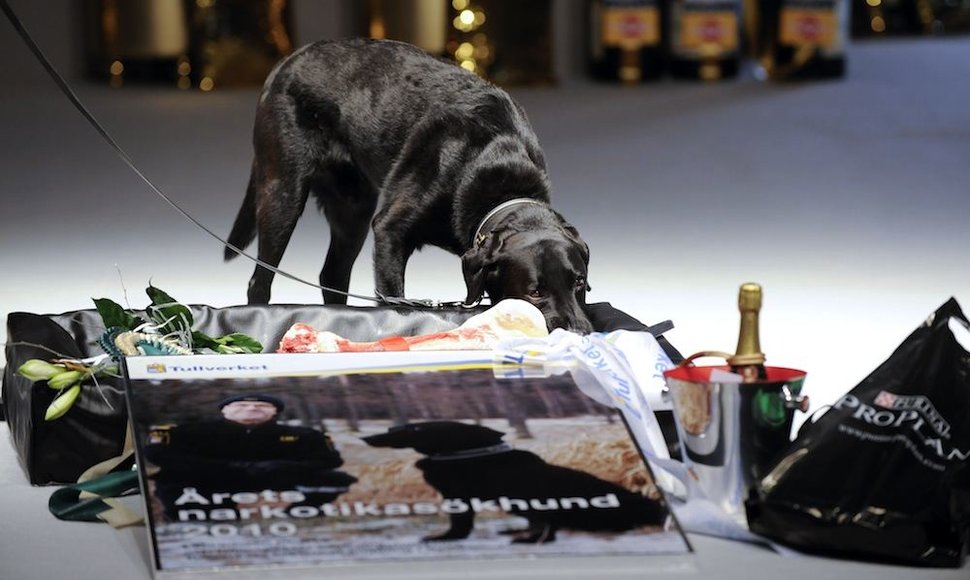When a Lithuanian citizen is caught by the Peruvian police, the first person to know it and to talk to the detainee is Eduardo Paškevičius Velarde, Lithuania's honorary consul. If circumstances allow, he even comes and meets the suspect, follows the case, and follows up on it even after the sentence is passed, contacting convicts and their families.
 |
| Asmeninio albumo nuotr./Eduardo Paškevičius Velarde |
Mr Paškevičius Velarde says that statistics of convictions had been deteriorating for several years but it is getting better now. Not so long ago, he could expect a call about a new detainee every three to four weeks, whereas now they come once in two or three months.
“I'm very glad about it. There are fewer [arrested] Lithuanians, but, for instance, more Spaniards and Poles,” the honorary consul says. “Currently, there are 27 Lithuanians in Peruvian prisons, including four women. Granted, one of them should be released by the end of spring, but there was one more person arrested several weeks ago.
“Two girls got caught recently in Cusco, about one-hour flight from Lima. One Lithuanian woman lives there. I wrote her a letter and warned officials she would be paying a visit on my behalf. As soon as I come back [to Peru], I'll fly to Cusco, go to the prison and see how I can help those two girls.”
Dark statistics
In February, Vilnius Mayor Artūras Zuokas posted on Facebook that he had received a help request from a former municipal employee. His daughter and her friend were arrested at Cusco Airport with drugs.
The girls were allegedly travelling to London, but somehow ended up in Latin America. It later emerged that the two Lithuanians, who were about to leave Cusco, had over one kilo of cocaine in their suitcases.
In January 2010, three Lithuanians were arrested for trafficking drugs. The travellers, who had tickets to Amsterdam, raised suspicion at Lima Airport. Customs officers x-rayed them and discovered 2kg of cocaine in their stomachs.
A year before, officers at the same airport had caught nine foreigners and four Peruvian nationals who tried to ship 33kg of cocaine to Spain. It was packed in small packages and hidden in capsules, the travellers' bodies, souvenirs. Among them was one Lithuanian who was hiding 160 capsules on him.
In December 2008, Narcotics Department officers detained a couple of young Lithuanians in possession of almost 5kg of drugs. The two were travelling to Riga via Amsterdam.
Tempted by easy money
Velarde says that Lithuanians and nationals of other countries are seduced into drug trafficking by easy money that is, in fact, extremely risky. After arrest, everyone usually tells the same story: how they were hired but later deceived by drug dealers.
Dealers offer several thousand euros, convince people to fly to Lima, collect a suitcase, and then come back to get their money. Lithuanians get a plain ticket, take off, and usually land straight in a Peruvian – or other – prison.
Sometimes drugs get hidden inside smugglers themselves – men swallow them packed in condoms, women often hide them in their vaginas. Before swallowing 8-10 bundles of drugs, one cannot eat or drink for several days. In some cases, gastric juices eat through the condom and the person dies from overdose. Since the cargo is usually pure narcotics, the chance of surviving is next to zero. One Lithuanian man has recently died like this.
The police is usually forewarned about an individual who might be carrying drugs. They know the hiding place and have a photo of the would-be offender. When he or she is going through the security check, an officers comes up and asks to see the passenger's luggage or takes him or her to get x-rayed.
While officers are busy with the offender – who is usually just a decoy to distract attention – a real trafficker with a much bigger cargo goes through undisturbed, while the poor Lithuanian (or any other foreign national) gets left behind as a scapegoat.
People of all sorts get dragged into the scheme – usually youths who are tempted by easy pay and are generally more risk-taking, but older people get caught too.
Serious drug dealers scout for less-educated people on the lower-income end of the social scale, unemployed, sometimes ex-prisoners who have just been released and have no job. Criminals usually target men, yet there have been more young women caught smuggling drugs lately. Sometimes drug dealers hire families with small children whom parents are encouraged to take along with them.
The recruitment takes various forms – through acquaintances, well-paid job offers, free trips to Latin America offers. Sometimes suspicious adverts appear online.
According to the Ministry of Foreign Affairs, Lithuanians in Latin America do not have a reputation of being drug smugglers – they are but a drop in the overall statistics. However, Lithuanian passports go through customs officers' hands much more often – some of them, fake, are provided by drug dealers. When the Foreign Ministry or the Lithuanian Embassy in Buenos Aires are notified about a detained national, they carry out a data check and sometimes report that a named person does not exist.
Drugs instead of diamonds
Diplomats and Latin American judges alike wonder at sheer naivety of these drug couriers.
There is little chance that such people will not draw officers' attention to themselves. They are often extremely anxious and are easily distinguishable from seasoned travellers – they carry around brand-new suitcases and present passports with hardly any visas in them. Very rarely does a person choose a faraway continent for his or her maiden voyage.
Unless they confess instantly, smugglers tell unconvincing stories: they had no idea there were drugs among their stuff; they didn't fully realize what was happening; they were deceived; they lost their suitcase and were given a new one; they thought no one punished for having such a small amount of drugs; a friend was carrying drugs and they somehow got into their suitcase; an acquaintance of three months offered them a free trip to Brazil. This way, detainees hope to get a more lenient punishment but also to avoid shame in front of their relatives.
Some people, who travel to a faraway country and discover what the job is all about, refuse the easy pay. They go straight to the police and become witnesses in drug trafficking cases.
Diplomats from the Lithuanian Embassy in Buenos Aires can recall a 50-year-old man who came to Argentina from the Netherlands. He and another man were recruited to smuggle diamonds – something that carries smaller sentences. In order to mislead the police, drug dealers put up would-be smugglers in different locations and made sure they did not meet.
The nature of the cargo only emerged on the day of the trip. The Lithuanian refused to go through with the crime and fled. He did not speak any Spanish, had to abandon his things and documents, but, after several days in Buenos Aires, he made it to the Embassy. Diplomats took the luckless traveller to a judge who was hearing the case of his “colleague” who had agreed to be a drug smuggler. The Lithuanian was given protection, issued travel documents, and his family took care of a ticket home.
No language, no money, no life
Dealing with law enforcement is not something people seek under any circumstances – especially when one is in a foreign country, knows nothing about its laws, and speaks no language.
In Latin America, drug smuggling can land one in jail for at least four years. In Argentina, one could spend as much as 16 years behind the bars. One judge once confessed to diplomats: “I'm not sorry for these people and propose maximum sentence – what they do is conscious drug smuggling and it inflicts great harm on other people.”
Such cases usually take extended periods of time, court hearings are scheduled a year or a year and a half after an arrest and sentences take even longer. An interpreter is only assigned for court hearings and interrogations, while everyday dealings behind the bars – shopping, complaining about other inmates' behaviour, or detention conditions – is left to prisoners' own devices. Local officers do not always speak English. Lithuanians, however, pick up Spanish quite fast and soon start using some phrases even while talking to Lithuanian diplomats.
Lithuania does not have treaties with most Latin American countries on handing over convicted nationals, so they have to serve their sentences abroad. A suspect can only move to his home country after trial and upon his own and his relatives' request. The latter are often clueless about what the member of their family got into, as he or she is ashamed to inform them.
The language barrier is only one thing in a long list of what can make life miserable. Life behind the bars is far from tourist brochures or even conditions in Lithuanian detention centres. Latin American prisons are overcrowded, they lack even beds and hygiene facilities; on the other hand, racketeering, violence, envy, and rage thrive.
A person is left alone in a foreign country – a honorary consul or his representative pays an occasional visit, while meeting relatives or receiving parcels is difficult. One is only allowed to write letters, contact the Lithuanian Embassy in Argentina (the only one in Latin America) or an honorary consul. Prisoners are fed poorly, but can buy more food in shops. They also have to buy their own toiletries. To do that, one has to get a job inside prison, but many factors – like failure to present a health check certificate – can make this difficult. The Embassy can mediate if relatives agree to send some money.
Diplomats have plenty of sad stories to tell not only about drug bags bursting inside stomachs but also about convicts in Latin American prisons. One man died from cirrhosis. He was seriously ill even before he went to Latin America. Some people have to worry about their kids left alone at home. To boost morale, diplomats try to get prisoners some literature, newspapers, etc. One woman once asked for glue. Even though diplomats were cautious at first, thinking she wanted to intoxicate herself, the real reason was somewhat tragicomic – she needed it to glue a broken piece of her tooth.
Even Lithuanian prisoners released on parole must remain in the country for several more years and periodically check in with their parole officers. These people are far from free – the state keeps their documents, so they cannot leave, they must find themselves a place to stay and a job.
No easy money
What should one do not to get into a situation like that? First of all, resist promises of easy money, be cautious when dealing with casual “friends” from Latin America or even Europe who offer a simple but profitable job, a free trip to faraway places in exchange for delivering a suitcase or a package.
It is not true that border control in Peru, Colombia, or Brazil is merely symbolic. Local police put much effort into fighting drug trafficking. If a person does not look like a traveller, is not on a business trip, officers watch him or her particularly closely.
They thoroughly go through such travellers' luggage. Even if they are not caught before departure, they can still get checked after landing in Europe.
Upon discovering that one might be required to smuggle drugs, one must immediately refuse the offer and go to the police. This can also be done by suspecting relatives.
“It's important for the person to not be naïve, to always check what they are carrying, not to take anything from people they don't know, even empty suitcases,” diplomats advise.
If one does get arrested, one should demand an attorney and an interpreter; otherwise, contact the embassy or an honorary consul to mediate.













